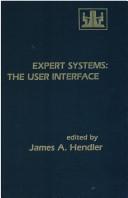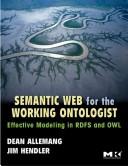| Listing 1 - 10 of 20 | << page >> |
Sort by
|

ISBN: 0893914290 9780893914295 Year: 1988 Publisher: Norwood: Ablex,
Abstract | Keywords | Export | Availability | Bookmark
 Loading...
Loading...Choose an application
- Reference Manager
- EndNote
- RefWorks (Direct export to RefWorks)
Digital
ISBN: 9783540480051 Year: 2006 Publisher: Berlin, Heidelberg Springer-Verlag Berlin Heidelberg
Abstract | Keywords | Export | Availability | Bookmark
 Loading...
Loading...Choose an application
- Reference Manager
- EndNote
- RefWorks (Direct export to RefWorks)
Computer science --- Computer architecture. Operating systems --- Information systems --- Artificial intelligence. Robotics. Simulation. Graphics --- Computer. Automation --- ICT (informatie- en communicatietechnieken) --- IR (information retrieval) --- programmeren (informatica) --- informatiesystemen --- computernetwerken --- robots

ISBN: 0898599822 Year: 1988 Publisher: Erlbaum
Abstract | Keywords | Export | Availability | Bookmark
 Loading...
Loading...Choose an application
- Reference Manager
- EndNote
- RefWorks (Direct export to RefWorks)
Artificial intelligence --- Cognition --- Parallel processing (Electronic computers)
Book
ISBN: 9798400707957 Year: 2023 Publisher: New York : Association for Computing Machinery,
Abstract | Keywords | Export | Availability | Bookmark
 Loading...
Loading...Choose an application
- Reference Manager
- EndNote
- RefWorks (Direct export to RefWorks)
This book, part of the ACM Books series, explores various aspects of computer science and its impact on society. It includes detailed discussions on geospatial data science, logic and computational complexity, and the evolution of the World Wide Web. The book aims to serve as a comprehensive resource for computer science professionals and enthusiasts, offering insights into the development of the web, linked data technologies, and the role of open data. It also delves into the historical and technical aspects of computing, presenting works of key figures in the field. This publication is designed for an audience interested in both the technical and societal implications of computing advancements.
Computer science. --- World Wide Web. --- Computer science --- World Wide Web
Book
ISBN: 1317766601 1315801795 131776661X Year: 2009 Publisher: New York : Psychology Press,
Abstract | Keywords | Export | Availability | Bookmark
 Loading...
Loading...Choose an application
- Reference Manager
- EndNote
- RefWorks (Direct export to RefWorks)
A recent area of interest in the Artificial Intelligence community has been the application of massively parallel algorithms to enhance the choice mechanism in traditional AI problems. This volume provides a detailed description of how marker-passing -- a parallel, non-deductive, spreading activation algorithm -- is a powerful approach to refining the choice mechanisms in an AI problem-solving system. The author scrutinizes the design of both the algorithm and the system, and then reviews the current literature and research in planning and marker passing. Also included: a comparison
Artificial intelligence. --- Parallel processing (Electronic computers) --- Cognition.

ISBN: 9780123735560 0123735564 9786611279363 1281279366 0080558380 9780080558387 9781281279361 6611279369 Year: 2008 Publisher: Amsterdam ; Boston : Morgan Kaufmann Publishers/Elsevier,
Abstract | Keywords | Export | Availability | Bookmark
 Loading...
Loading...Choose an application
- Reference Manager
- EndNote
- RefWorks (Direct export to RefWorks)
The promise of the Semantic Web to provide a universal medium to exchange data information and knowledge has been well publicized. There are many sources too for basic information on the extensions to the WWW that permit content to be expressed in natural language yet used by software agents to easily find, share and integrate information. Until now individuals engaged in creating ontologies-- formal descriptions of the concepts, terms, and relationships within a given knowledge domain-- have had no sources beyond the technical standards documents. Semantic Web for the Working Onto
Web site development --- Metadata --- Semantic Web --- Sites Web --- Métadonnées --- Web sémantique --- Développement --- Semantic web --- Metadata. --- Semantic Web. --- Web site development. --- Métadonnées --- Web sémantique --- Développement --- Information Technology --- General and Others --- Semantic integration (Computer systems) --- Semantic networks (Information theory) --- World Wide Web --- Microformats --- Data about data --- Meta-data --- Information organization --- Development of Web sites --- Web sites --- Internet programming --- Development
Book
ISBN: 148421157X 1484211561 Year: 2016 Publisher: Berkeley, CA : Apress : Imprint: Apress,
Abstract | Keywords | Export | Availability | Bookmark
 Loading...
Loading...Choose an application
- Reference Manager
- EndNote
- RefWorks (Direct export to RefWorks)
Will your next doctor be a human being—or a machine? Will you have a choice? If you do, what should you know before making it? This book introduces the technically-engaged reader to the convergence of two technologies: artificial intelligence in its modern incarnation and the growing trend of social networking to "reach off the Web" into the real world. Both these technologies are important in their own right, but as they converge we are approaching an historic inflection point in the partnership between human beings and machines with profound impacts on the future not only of computing but of our world. In this book, AI expert and researcher James Hendler explores the social implications of artificial intelligence systems in the context of a close examination of the technologies that make them possible. The author evaluates the utopian and dystopian prognostications of the social implications of the convergence of AI and social networking. Social Machines: The Coming Collision of Artificial Intelligence, Social Networking, and Humanity is your field guide to the future of your personal relationships with the machines that are already changing your life and to the future of your machine-mediated relationships with other human beings and humanoid constructs.
Computer science. --- Computers. --- Computer Science. --- Computing Methodologies. --- Computing Milieux. --- Intelligent agents (Computer software) --- Human body and technology. --- Technological innovations --- Sociological aspects. --- Breakthroughs, Technological --- Innovations, Industrial --- Innovations, Technological --- Technical innovations --- Technological breakthroughs --- Technological change --- Technology and the human body --- Agents, Autonomous (Computer software) --- Agents, Cognitive (Computer software) --- Agents, Intelligent (Computer software) --- Assistants, Cognitive (Computer software) --- Assistants, Intelligent software --- Autonomous agents (Computer software) --- Cognitive agents (Computer software) --- Cognitive assistants (Computer software) --- IAs (Computer software) --- Intelligent agent software --- Intelligent software agents --- Intelligent software assistants --- Software agents (Computer software) --- Special agents (Computer software) --- Automatic computers --- Automatic data processors --- Computer hardware --- Computing machines (Computers) --- Electronic brains --- Electronic calculating-machines --- Electronic computers --- Hardware, Computer --- Computer systems --- Cybernetics --- Machine theory --- Calculators --- Cyberspace --- Informatics --- Science --- Creative ability in technology --- Inventions --- Domestication of technology --- Innovation relay centers --- Research, Industrial --- Technology transfer --- Technology --- Artificial intelligence --- Computer programs --- Artificial intelligence. --- Artificial Intelligence. --- AI (Artificial intelligence) --- Artificial thinking --- Intellectronics --- Intelligence, Artificial --- Intelligent machines --- Machine intelligence --- Thinking, Artificial --- Bionics --- Cognitive science --- Digital computer simulation --- Electronic data processing --- Logic machines --- Self-organizing systems --- Simulation methods --- Fifth generation computers --- Neural computers
Book
ISBN: 9780123859655 9780123859662 0123859662 0123859654 9786613101327 1283101327 9781283101325 Year: 2011 Publisher: Waltham (Mass.) : Morgan Kaufmann/Elsevier,
Abstract | Keywords | Export | Availability | Bookmark
 Loading...
Loading...Choose an application
- Reference Manager
- EndNote
- RefWorks (Direct export to RefWorks)
Semantic Web models and technologies provide information in machine-readable languages that enable computers to access the Web more intelligently and perform tasks automatically without the direction of users. These technologies are relatively recent and advancing rapidly, creating a set of unique challenges for those developing applications. Semantic Web for the Working Ontologist is the essential, comprehensive resource on semantic modeling, for practitioners in health care, artificial intelligence, finance, engineering, military intelligence, enterprise architecture, and more. Focused on developing useful and reusable models, this market-leading book explains how to build semantic content (ontologies) and how to build applications that access that content. New in this edition: Coverage of the latest Semantic Web tools for organizing, querying, and processing information - see details in TOC below Detailed information on the latest ontologies used in key web applications including ecommerce, social networking, data mining, using government data, and more . Provides practical information for all programmers and subject matter experts engaged in modeling data to fit the requirements of the Semantic Web. . De-emphasizes algorithms and proofs, focusing instead on real-world problems, creative solutions, and highly illustrative examples. . Presents detailed, ready-to-apply "recipes" for use in many specific situations. . Shows how to create new recipes from RDF, RDFS, and OWL constructs.
Information systems --- Web site development. --- Semantic Web. --- Metadata. --- Sites Web --- Web sémantique --- Métadonnées --- Développement --- Data about data --- Meta-data --- Information organization --- Semantic integration (Computer systems) --- Semantic networks (Information theory) --- World Wide Web --- Microformats --- Development of Web sites --- Web sites --- Internet programming --- Development --- Metadata --- Semantic Web --- Web site development --- #KVHA:Ontologie --- #KVHA:OWL --- #KVHA:RDFS --- #KVHA: Semantic web --- 681.3*H --- 681.3*H Information systems
Multi
ISBN: 9781484211564 1484211561 Year: 2016 Publisher: Berkeley, CA : Apress : Imprint: Apress,
Abstract | Keywords | Export | Availability | Bookmark
 Loading...
Loading...Choose an application
- Reference Manager
- EndNote
- RefWorks (Direct export to RefWorks)
Will your next doctor be a human being—or a machine? Will you have a choice? If you do, what should you know before making it? This book introduces the technically-engaged reader to the convergence of two technologies: artificial intelligence in its modern incarnation and the growing trend of social networking to "reach off the Web" into the real world. Both these technologies are important in their own right, but as they converge we are approaching an historic inflection point in the partnership between human beings and machines with profound impacts on the future not only of computing but of our world. In this book, AI expert and researcher James Hendler explores the social implications of artificial intelligence systems in the context of a close examination of the technologies that make them possible. The author evaluates the utopian and dystopian prognostications of the social implications of the convergence of AI and social networking. Social Machines: The Coming Collision of Artificial Intelligence, Social Networking, and Humanity is your field guide to the future of your personal relationships with the machines that are already changing your life and to the future of your machine-mediated relationships with other human beings and humanoid constructs.
Computer science --- Programming --- Information systems --- Computer. Automation --- computers --- informatica --- systeemontwikkeling (informatica) --- methodologieën --- computerkunde --- Artificial intelligence. --- Computers. --- Artificial Intelligence. --- Computing Milieux.

ISBN: 9780123735560 0123735564 9780080558387 0080558380 1281279366 9781281279361 9786611279363 6611279369 Year: 2008 Publisher: Boston Morgan Kaufmann Publishers/Elsevier
Abstract | Keywords | Export | Availability | Bookmark
 Loading...
Loading...Choose an application
- Reference Manager
- EndNote
- RefWorks (Direct export to RefWorks)
The promise of the Semantic Web to provide a universal medium to exchange data information and knowledge has been well publicized. There are many sources too for basic information on the extensions to the WWW that permit content to be expressed in natural language yet used by software agents to easily find, share and integrate information. Until now individuals engaged in creating ontologies-- formal descriptions of the concepts, terms, and relationships within a given knowledge domain-- have had no sources beyond the technical standards documents. Semantic Web for the Working Ontologist transforms this information into the practical knowledge that programmers and subject domain experts need. Authors Allemang and Hendler begin with solutions to the basic problems, but don't stop there: they demonstrate how to develop your own solutions to problems of increasing complexity and ensure that your skills will keep pace with the continued evolution of the Semantic Web. . Provides practical information for all programmers and subject matter experts engaged in modeling data to fit the requirements of the Semantic Web. . De-emphasizes algorithms and proofs, focusing instead on real-world problems, creative solutions, and highly illustrative examples. . Presents detailed, ready-to-apply "recipes" for use in many specific situations. . Shows how to create new recipes from RDF, RDFS, and OWL constructs.
| Listing 1 - 10 of 20 | << page >> |
Sort by
|

 Search
Search Feedback
Feedback About UniCat
About UniCat  Help
Help News
News